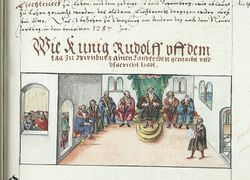Hoftag

A Hoftag (pl. Hoftage) was the name given to an informal and irregular assembly convened by the King of the Romans, the Holy Roman Emperor or one of the Princes of the Empire, with selected chief princes within the empire. Early scholarship also refers to these meetings as imperial diets (Reichstage), even though these gatherings were not really about the empire in general, but with matters concerning their individual rulers. In fact, the legal institution of the imperial diet appeared much later. In the early and high Middle Ages these assemblies were mostly held in the imperial palaces (Kaiserpfalz).
From the feudal obligation of chief princes to stand by the king's side in word and deed, a consequent duty was derived by the time of the
When the king held such assemblies and whom he invited was entirely at his discretion. Hence, a distinction between the counsel given by the princes and their legal consent to a decision is difficult to make. However, it was from their obligation to advise the king, that the right soon emerged for the princes to be consulted on important matters concerning the empire, such as the declaration of an

Documents of the High and Late Middle Ages containing important policy decisions or orders concerning imperial estates emphasize that the decisions were made with the "advice" and "consent" of the princes. Both terms are used in such documents synonymously from a legal point of view. Those princes who were not invited or who found themselves in opposition to the king, did not, however, feel bound by the decisions of the Hoftage.
Following the
In the wake of the decline of the kingdom to its respective allodial estates at the end of the 14th century and the general weakness at the time of its count-kings (Grafenkönige), "kingless assemblies" (Königlose Tage) gained increasing importance. At these gatherings, the principal rulers in the empire held counsel. Only rarely were Hoftage now called. From these kingless assemblies emerged the legal institution of the Imperial Diet at the end of the 15th century.
See also
- Locations of Imperial Diets
- Reichstag (Holy Roman Empire)
Literature
- Karl-Friedrich Krieger: König, Reich und Reichsreform im Spätmittelalter. 2nd revised edition. Oldenbourg, Munich, 2005, ISBN 3-486-57670-4, (Enzyklopädie Deutscher Geschichte 14).
- Malte Prietzel: Das Heilige Römische Reich im Spätmittelalter. Wissenschaftliche Buchgesellschaft, Darmstadt, 2004, ISBN 3-534-15131-3, (Geschichte kompakt - Mittelalter).
- Gabriele Annas: Hoftag - Gemeiner Tag - Reichstag. Studien zur strukturellen Entwicklung deutscher Reichsversammlungen des späten Mittelalters (1349 - 1471). 2 volumes. Vandenhoeck & Ruprecht, Göttingen, 2004, ISBN 3-525-36061-4, (Schriftenreihe der Historischen Kommission bei der Bayerischen Akademie der Wissenschaften 68), (Zugleich: Köln, Univ., Diss., 1997), (with CD ROM: Verzeichnis der Besucher deutscher Reichsversammlungen des späten Mittelalters (1349 to 1471)).
